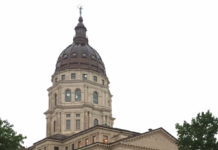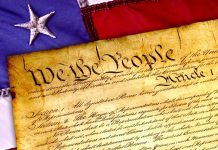(Updated to reflect House final vote, new comments from Tuesday and that a federal appeals court has upheld similar law in Texas)
The Kansas House on Tuesday approved a new way to make it tougher for anyone in Kansas under 18 to view pornography online with a new age-verification requirement.
The House voted 92-31 to approve the legislation, which now goes to the governor. The bill passed unanimously in the Senate.
It is similar to what eight other states have enacted since 2022 and are now being considered in more than a dozen others.
The legislation has been generally considered popular nationally where it’s been passing with overwhelming bipartisan support and signed into law by Republican and Democratic governors.
“Age verification is effective for protecting children,” said Republican state Rep. Susan Humphries, chair of the House Judiciary Committee.
“This bill is a powerful tool for us,” Humphries said. “This is putting porn websites on notice that they cannot continue to offer websites to children without any sort of accountability.
“It is our responsibility to protect the children of Kansas.”
Democratic state Rep. John Carmichael of Wichita said the bill leaves open the possibility of varying views of what kind of material might be pornographic and harmful to children.
“What you and I believe is harmful to minors may well differ,” Carmichael said.
“I think most all of us – hopefully all of us – would think graphic descriptions of nudity is harmful to minors,” he said.
“But there are a number of things that we can disagree about, whether it is harmful or beneficial to minors,” he said
Carmichael referred to books that groups such as “Moms for Liberty” want removed from school library shelves.
“This legislation would arguably eliminate those books from online access,” he said.
Other Democrats questioned whether homosexuality would fall under the purview of the bill, such as banning books listing friendly places for the LGBTQ community.
“As we look at bills like this, we need to look at the unintended consequences,” said Democratic state Rep. Brandon Woodard of Lenexa.
Humphries said the bill only applied to material where at least 25% of the total content on a website meets the state’s definition of “harmful to minors.”
The bill was praised was Brittany Jones, director of policy and engagement for Kansas Family Voice.
“Kansas families are facing the daunting task of protecting their children from a host of harms online – online pornography being the top of that list for many families,” Jones said in a statement.
“The majority of this exposure is accidental,” she said. “Even the most diligent parents struggle to protect their children from this industry that is profiting off their children. We must stand up for our children.”
Democratic state Rep. Nikki McDonald of Olathe – joined by three other House members – raised a litany of issues with the bill in a statement explaining her opposition.
She called it “government overreach.”
“While I am concerned about children accessing pornography online and otherwise, my ‘no’ vote reflects my major concerns regarding privacy, cybersecurity, freedom of speech and censorship,” McDonald said.
“Passage of this bill will just send people to the dark web, which will expose those people to far more dangerous imagery,” she said.
Bills likes the one in Kansas basically require any website that has a substantial amount of “material harmful to minors” to verify the age of users accessing the site.
They require adult websites to verify that someone is 18 or older before giving them access to the content, a very different approach from using internet filters or parental controls to keep kids from viewing salacious content online.
The Kansas bill only applies if at least 25% of the total content on a website meets the state’s definition of “harmful to minors.” Other states have set that at 33.33%.
The websites are required, under the Kansas bill, to use a commercially available database that is regularly used by businesses or government agencies to verify someone’s age.
The bill also allows them to use any other “commercially reasonable method of age and identity verification.”
Violations of the law would be reported to the attorney general, who would be responsible for investigating cases and bringing lawsuits to stop violations from continuing.
The attorney general may seek to impose a civil penalty on the website’s operator of between $500 and $10,000 for each violation.
A parent of a minor who accesses an adult website without verification of their age could sue the commercial business that violated the law.
The parent could seek actual damages for a minor who accessed the site, statutory damages in an amount not less than $50,000 plus attorney’s fees and costs.
The bill bars the third-party that conducts the independent age verification from keeping any identifying information after access to the website is granted.
So far, similar bills have been enacted in Arkansas, Montana, Mississippi, Utah, Virginia, North Carolina, Louisiana and Texas, according to the Free Speech Coalition, a trade association of the adult entertainment industry.
Last year, Politico reported that Pornhub – characterized as the “YouTube of pornography” with 42 billion visits in 2019 – saw its traffic in Louisiana drop 80% after that state adopted its law.
The site also stopped operating in Utah, Mississippi and Virginia – three other states that have adopted similar laws requiring age verification.
Other states with similar laws on the books have already survived legal challenges.
Last October, a federal judge threw out an adult entertainment group’s lawsuit against the Louisiana law requiring adult websites to verify the ages of anyone accessing the platform.
The judge found that the state officials named in the lawsuit couldn’t be sued because they aren’t responsible for enforcing the law.
Similarly last August, a federal judge let stand a Utah law requiring adult websites to verify the age of anyone seeking to access their platform.
The judge found that the plaintiffs couldn’t sue Utah officials because the law didn’t direct the state to pursue adult websites violating the law.
In September, federal judge halted a Texas law requiring age verification and a health warning for viewing pornographic websites.
The judge ruled that the law ran afoul of free speech rights was too vague.
The 5th U.S. Circuit Court of Appeals, however, stayed the injunction and earlier this month upheld the law.
About a week later, Pornhub shut down its Texas website after the the 5th Circuit found in favor the law.
















